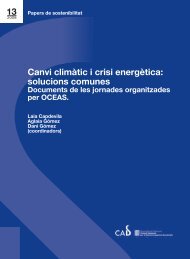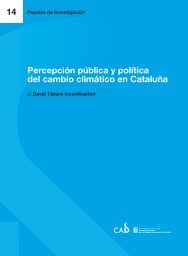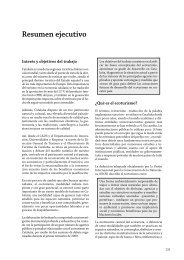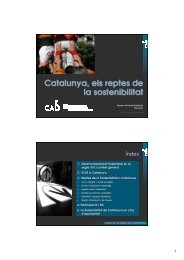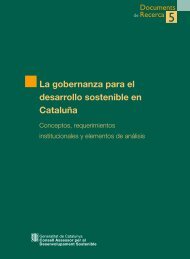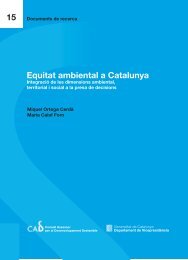Estratègies per al desenvolupament sostenible - Generalitat de ...
Estratègies per al desenvolupament sostenible - Generalitat de ...
Estratègies per al desenvolupament sostenible - Generalitat de ...
Create successful ePaper yourself
Turn your PDF publications into a flip-book with our unique Google optimized e-Paper software.
Charges were therefore low. Later schemes have tried to put more emphasis onthe incentive effect.Enforcing payment and <strong>de</strong><strong>al</strong>ing with evasion without increasing unduly theadministrative costs involved, especi<strong>al</strong>ly where there is poor regulatory enforcement.Mexico’s wastewater charge has suffered from poor enforcement.Overcoming resistance from certain groups who are likely to lose as a result of theintroduction of the market mechanism. Fossil fuel energy taxes have been resistedby energy-intensive industry sectors with the result that they have often beenwatered down by the inclusion of exemptions and reductionsDe<strong>al</strong>ing with regressive impacts on the poor who are least capable of adapting tothe proposed changes. Taxes on fossil fuels, for example, may have adverseimpacts on the poor unless assistance can be given to these groups to adoptenergy saving measures; for example, upgrading cooking and heating equipmentto new, more efficient means.Ensuring that the revenue raised is used appropriately, and to provi<strong>de</strong> safeguardsagainst misappropriation. This will usu<strong>al</strong>ly involve setting up institution<strong>al</strong> structures.Mainstreaming sustainable <strong>de</strong>velopment into investment and financi<strong>al</strong> <strong>de</strong>cisionmaking.176The success and credibility of a strategy for sustainable <strong>de</strong>velopment <strong>de</strong>pends onthe extent to which key stakehol<strong>de</strong>rs act in accordance with it. For example, astrategy that emphasizes the promotion of renewable energy or energy efficiency isun<strong>de</strong>rmined if investments are ma<strong>de</strong> by private sector or public sector organizationsin fossil fuel power plants. This means that key financi<strong>al</strong> <strong>de</strong>cisions have to be coherentwith the NSSD, and that at the same time, the integration of sustainable <strong>de</strong>velopmentobjectives into companies’ <strong>de</strong>cision making should be one of the key objectives ofthe NSSD. To achieve this, a number of different actors must be involved, notably:government <strong>de</strong>partments, the private sector and financi<strong>al</strong> institutions both in-countryand overseas. Given the importance of foreign investment in <strong>de</strong>veloping countries,the situation is complicated by the need to address foreign-owned companies andthe financi<strong>al</strong> institutions that support them. Most corporate <strong>de</strong>cisions on foreign directinvestment (FDI) involve the participation of a financi<strong>al</strong> institution – either directlythrough the provision of a loan to cover establishment costs, or indirectly through,for example, the provision of risk insurance. Loc<strong>al</strong> financi<strong>al</strong> institutions, which in




